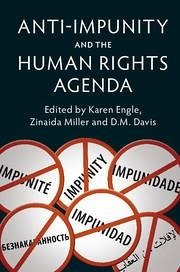Anti-Impunity and the Human Rights Agenda
Herausgeber: Engle, Karen; Davis, D M; Miller, Zinaida
Anti-Impunity and the Human Rights Agenda
Herausgeber: Engle, Karen; Davis, D M; Miller, Zinaida
- Broschiertes Buch
- Merkliste
- Auf die Merkliste
- Bewerten Bewerten
- Teilen
- Produkt teilen
- Produkterinnerung
- Produkterinnerung
This volume presents and critiques the distorted effects of the international human rights movement's focus on the fight against impunity.
Andere Kunden interessierten sich auch für
![Human Trafficking Human Trafficking]() Human Trafficking30,99 €
Human Trafficking30,99 €![The Law of Collaborative Defence Procurement in the European Union The Law of Collaborative Defence Procurement in the European Union]() Baudouin HeuninckxThe Law of Collaborative Defence Procurement in the European Union41,99 €
Baudouin HeuninckxThe Law of Collaborative Defence Procurement in the European Union41,99 €![Social Justice for Children and Young People Social Justice for Children and Young People]() Social Justice for Children and Young People44,99 €
Social Justice for Children and Young People44,99 €![In Flight from Conflict and Violence In Flight from Conflict and Violence]() In Flight from Conflict and Violence36,99 €
In Flight from Conflict and Violence36,99 €![Towards a European Energy Union Towards a European Energy Union]() Volker RoebenTowards a European Energy Union41,99 €
Volker RoebenTowards a European Energy Union41,99 €![The Anti-Federalist Papers and the Constitutional Convention Debates The Anti-Federalist Papers and the Constitutional Convention Debates]() Ralph KetchamThe Anti-Federalist Papers and the Constitutional Convention Debates8,49 €
Ralph KetchamThe Anti-Federalist Papers and the Constitutional Convention Debates8,49 €![Equality Before the Law Equality Before the Law]() Michael P ForanEquality Before the Law56,99 €
Michael P ForanEquality Before the Law56,99 €-
-
-
This volume presents and critiques the distorted effects of the international human rights movement's focus on the fight against impunity.
Produktdetails
- Produktdetails
- Verlag: Cambridge University Press
- Seitenzahl: 398
- Erscheinungstermin: 16. Dezember 2016
- Englisch
- Abmessung: 231mm x 153mm x 23mm
- Gewicht: 558g
- ISBN-13: 9781107439221
- ISBN-10: 1107439221
- Artikelnr.: 47353847
- Herstellerkennzeichnung
- Libri GmbH
- Europaallee 1
- 36244 Bad Hersfeld
- gpsr@libri.de
- Verlag: Cambridge University Press
- Seitenzahl: 398
- Erscheinungstermin: 16. Dezember 2016
- Englisch
- Abmessung: 231mm x 153mm x 23mm
- Gewicht: 558g
- ISBN-13: 9781107439221
- ISBN-10: 1107439221
- Artikelnr.: 47353847
- Herstellerkennzeichnung
- Libri GmbH
- Europaallee 1
- 36244 Bad Hersfeld
- gpsr@libri.de
Introduction; Part I. What Does Anti-Impunity Mean?: 1. A genealogy of the
criminal turn in human rights Karen Engle; 2. Anti-impunity as deflection
of argument Samuel Moyn; 3. Doing history with impunity Vasuki Nesiah; Part
II. How and Where Does Anti-Impunity Operate?: 4. The South African Truth
Commission and the AZAPO case: a reflection almost two decades later D. M.
Davis; 5. Anti-impunity politics in post-genocide Rwanda Zinaida Miller; 6.
Whose exceptionalism? Debating the inter-American view on amnesty and the
Brazilian case Fabia Fernandes Carvalho Veçoso; 7. The distributive
politics of impunity and anti-impunity: lessons from four decades of
Colombian peace negotiations Helena Alviar García and Karen Engle; 8. From
political repression to torturer impunity: the narrowing of Filártiga v.
Peña-Irala Natalie R. Davidson; Part III. Are There Alternatives to
Anti-Impunity?: 9. Impunity in a different register: people's tribunals and
questions of judgment, law and responsibility Dianne Otto; 10. Beyond
Nuremberg: the historical significance of the post-Apartheid transition in
South Africa Mahmood Mamdani.
criminal turn in human rights Karen Engle; 2. Anti-impunity as deflection
of argument Samuel Moyn; 3. Doing history with impunity Vasuki Nesiah; Part
II. How and Where Does Anti-Impunity Operate?: 4. The South African Truth
Commission and the AZAPO case: a reflection almost two decades later D. M.
Davis; 5. Anti-impunity politics in post-genocide Rwanda Zinaida Miller; 6.
Whose exceptionalism? Debating the inter-American view on amnesty and the
Brazilian case Fabia Fernandes Carvalho Veçoso; 7. The distributive
politics of impunity and anti-impunity: lessons from four decades of
Colombian peace negotiations Helena Alviar García and Karen Engle; 8. From
political repression to torturer impunity: the narrowing of Filártiga v.
Peña-Irala Natalie R. Davidson; Part III. Are There Alternatives to
Anti-Impunity?: 9. Impunity in a different register: people's tribunals and
questions of judgment, law and responsibility Dianne Otto; 10. Beyond
Nuremberg: the historical significance of the post-Apartheid transition in
South Africa Mahmood Mamdani.
Introduction; Part I. What Does Anti-Impunity Mean?: 1. A genealogy of the
criminal turn in human rights Karen Engle; 2. Anti-impunity as deflection
of argument Samuel Moyn; 3. Doing history with impunity Vasuki Nesiah; Part
II. How and Where Does Anti-Impunity Operate?: 4. The South African Truth
Commission and the AZAPO case: a reflection almost two decades later D. M.
Davis; 5. Anti-impunity politics in post-genocide Rwanda Zinaida Miller; 6.
Whose exceptionalism? Debating the inter-American view on amnesty and the
Brazilian case Fabia Fernandes Carvalho Veçoso; 7. The distributive
politics of impunity and anti-impunity: lessons from four decades of
Colombian peace negotiations Helena Alviar García and Karen Engle; 8. From
political repression to torturer impunity: the narrowing of Filártiga v.
Peña-Irala Natalie R. Davidson; Part III. Are There Alternatives to
Anti-Impunity?: 9. Impunity in a different register: people's tribunals and
questions of judgment, law and responsibility Dianne Otto; 10. Beyond
Nuremberg: the historical significance of the post-Apartheid transition in
South Africa Mahmood Mamdani.
criminal turn in human rights Karen Engle; 2. Anti-impunity as deflection
of argument Samuel Moyn; 3. Doing history with impunity Vasuki Nesiah; Part
II. How and Where Does Anti-Impunity Operate?: 4. The South African Truth
Commission and the AZAPO case: a reflection almost two decades later D. M.
Davis; 5. Anti-impunity politics in post-genocide Rwanda Zinaida Miller; 6.
Whose exceptionalism? Debating the inter-American view on amnesty and the
Brazilian case Fabia Fernandes Carvalho Veçoso; 7. The distributive
politics of impunity and anti-impunity: lessons from four decades of
Colombian peace negotiations Helena Alviar García and Karen Engle; 8. From
political repression to torturer impunity: the narrowing of Filártiga v.
Peña-Irala Natalie R. Davidson; Part III. Are There Alternatives to
Anti-Impunity?: 9. Impunity in a different register: people's tribunals and
questions of judgment, law and responsibility Dianne Otto; 10. Beyond
Nuremberg: the historical significance of the post-Apartheid transition in
South Africa Mahmood Mamdani.








